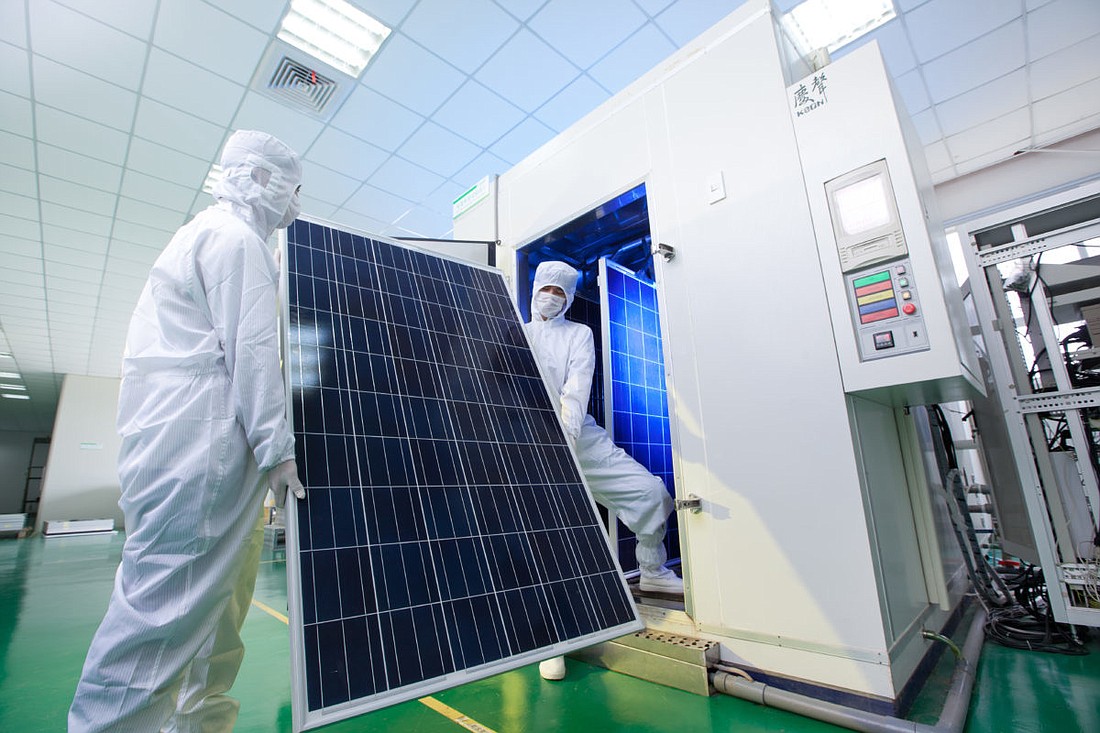
JinkoSolar (U.S.) Inc. proposes to open an operation in Jacksonville, creating 200 jobs.
It’s the first Chinese solar-panel manufacturer to confirm plans to open a U.S. plant after President Donald Trump imposed tariffs on imported panels in January.
JinkoSolar, part of JinkoSolar Holding Co. Ltd., based in Shanghai, China, is named in legislation filed Wednesday with City Council at the request of Mayor Lenny Curry.
“This is the only tier one international solar manufacturer in the U.S.,” said council Vice President Aaron Bowman, also senior vice president of business development for JAXUSA Partnership, the economic development division of JAX Chamber.
“We’ve got one of the biggest solar manufacturers in the world,” he said.
Only the title and basics of the legislation were posted on the city’s website Wednesday afternoon. Details are in the legislation and economic development agreement, which weren’t immediately available.
The legislation title does not state the location of the plant or the capital investment.
The city proposes tax incentives of $3.4 million, comprising a $3.2 million Recapture Enhanced Value grant and a $200,000 Qualified Target Industry tax refund for JinkoSolar.
The state will pick up the remaining $800,000 of the total $1 million QTI refund. Other state incentives were not included.
The bill, 2018-149, is on a fast track of two council meetings. It will be introduced March 13 and could be approved March 27.
It wasn’t immediately clear what will become of Project Volt, the code name for a solar-panel manufacturer that pledged to bring 800 positions to Jacksonville in legislation enacted in January.
Widely reported to be JinkoSolar by several national publications, Volt pledged to invest $410 million at two Jacksonville facilities – at Cecil Commerce Center and in North Jacksonville.
The JinkoSolar title filed Wednesday indicates a smaller plant and employment than Volt.
The legislation Wednesday comes six weeks after JinkoSolar said its board authorized its U.S. subsidiary to finalize planning for the construction of an advanced solar manufacturing facility in the United States.
On Jan. 29, JinkoSolar Holding Co. said wholly owned JinkoSolar (U.S.) Inc. signed a major master solar module supply agreement with an unidentified U.S. counterparty.
Project Volt said it intended to create the jobs at an average salary of $45,562 by year-end 2019 at a manufacturing plant in AllianceFlorida at Cecil Commerce Center and a distribution center along Faye Road in North Jacksonville.
Bowman said he could not comment on Volt.
It was a quick deal.
Project Volt was introduced as the city’s first legislation of 2018 on a fast track. On Jan. 23, City Council approved up to $24.6 million in tax incentives and the state pledged at least $29 million in grants and tax breaks.
A dozen jobs were posted on Indeed.com for JinkoSolar in the days before the company’s Jan. 29 announcement.
That followed a Jan. 5 Google search that found two LinkedIn job entries for a “Sr. HR Manager Job” and a “Human Resources Manager” for JinkoSolar in Jacksonville.
The 12 newer positions included managers for facilities, logistics, C&B for compensation and benefits, manufacturing, ER for employee relations, L&D for training, administration, legal, process engineering, equipment engineering and construction as well as deputy general manager.
All are full-time jobs.
The postings outlined the need for top-level managers to set up and run the functions, which Volt documents and legislation showed will be manufacturing and distribution of solar panels and modules.
Volt legislation documents stated the investment would be split between real estate improvements at $153 million, with $257 million in new equipment and machinery.
JinkoSolar has not responded to requests for comment and the city has not identified Volt.
JinkoSolar was established in 2006 and publicly listed on the New York Stock Exchange in 2010. It calls itself a “rapidly growing, vertically integrated photovoltaic module manufacturer.”
A decision by JinkoSolar to set up a U.S. solar panel manufacturing plant would coincide with Trump’s decision announced Jan. 22 to impose duties of up to 30 percent on solar equipment made abroad.
Bloomberg.com said the duties are lower than the 35 percent rate the U.S. International Trade Commission recommended in October after it found imported panels were harming American manufacturers.
Under the Jinko agreement announced Jan. 29, Jinko U.S. will provide around 1.75 GW of high-efficiency solar modules over about three years, the company said.
“This deal will further solidify our leadership in the U.S. market,” said Nigel Cockroft, general manager of Jinko U.S., whose office is in San Francisco.
“An agreement of this magnitude exemplifies JinkoSolar’s commitment to provide our clients with the most reliable products and dependable, regional customer service,” he said in the announcement.
The announcement said JinkoSolar continues to closely monitor treatment of imports of solar cells and modules under the U.S. trade laws.
JinkoSolar, which is publicly traded, describes itself as a global leader in the solar industry. It distributes solar products and sells its services to an international utility, commercial and residential customer base in China, the U.S., Japan, Germany, the United Kingdom, Chile, South Africa, India, Mexico, Brazil, the United Arab Emirates, Italy, Spain, France, Belgium and other countries and regions.
It said it built a vertically integrated solar product value chain, with an integrated annual capacity of 7 GW for silicon ingots and wafers, 4.5 GW for solar cells, and 8 GW for solar modules, as of September 30, 2017.
JinkoSolar employs more than 15,000 employees among its eight global production facilities and 16 subsidiaries in Japan, Singapore, India, Turkey, Germany, Italy, Switzerland, United States, Canada, Mexico, Brazil, Chile, Australia, South Africa and United Arab Emirates.
It said it has global sales teams in the United Kingdom, Bulgaria, Greece, Romania, Jordan, Saudi Arabia, South Africa, Egypt, Morocco, Ghana, Kenya, Costa Rica, Colombia, Panama, Argentina.